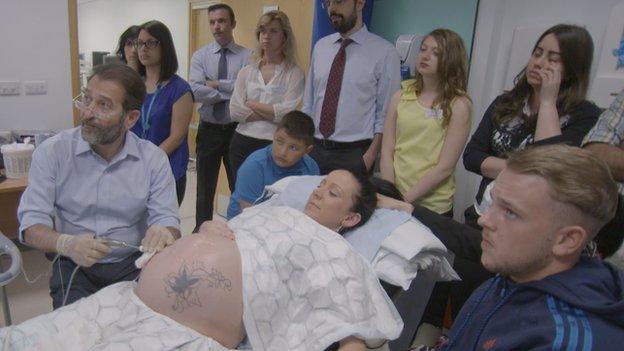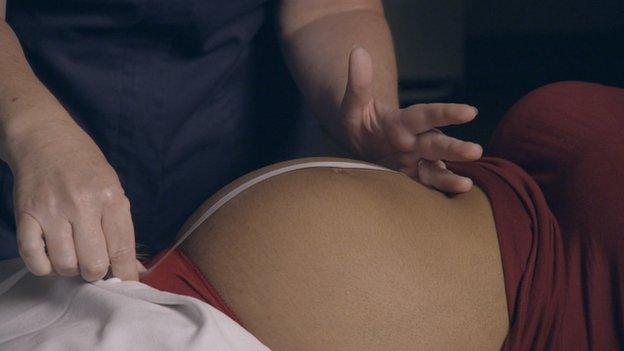'Half of UK stillbirths could be prevented with scans'
- Published

Prof Nicolaides offers Doppler scans to all women three times during their pregnancies
More than half of stillbirths in the UK could be prevented if the NHS implemented additional scans, a leading obstetrician has told Panorama.
Each year, more than 3,000 babies are stillborn in the UK, one of the worst rates in the developed world.
Prof Kypros Nicolaides says offering all women Doppler scans, which measure blood flow between the placenta and foetus, could save 1,500 babies a year.
The Department of Health said it has asked him to submit his research.
Three-quarters of a million babies are born in the UK each year. One in 200 dies before birth, mostly to mothers with no known risk factors.
Many deaths are caused by a failure in the mother's placenta - if the blood flow is abnormal, babies are starved of food and oxygen.
Often the problems occur towards the end of pregnancy, but, if identified, the baby can be monitored carefully and delivered by Caesarean before the placenta fails.
This can be spotted by a Doppler scan, but most hospitals use these only on the 15%-20% of women who are deemed high risk - as per national guidelines.
'Simple adjustments'
All pregnant women who attend Prof Nicolaides' NHS clinic at King's College Hospital in London are offered the Doppler scan at 12, 22 and 32 weeks of pregnancy.
Prof Nicolaides is regarded by many as the father of foetal medicine as he was the scientist and obstetrician who developed the 12-week Down's Syndrome scan, still given to every pregnant woman in the UK.
He has been researching Doppler scans for 15 years and believes extending the programme across the UK could cut the stillbirth rate by as much as 50% - potentially 1,500 babies a year.

Case study - Reena Patel from Leicester
Reena Patel "My baby's dead, how could I give birth to him? It's supposed to be a happy occasion"
"Mayan was my first baby. I always felt fear. People would talk about how they could feel their baby kicking hard. But I only felt flutters. I raised my concerns with the midwife. She put me at ease saying some babies don't kick hard. I wasn't offered any extra scans.
"Then one morning, at 32 weeks, I woke up feeling odd. I hadn't felt my son move. I went to the hospital. It never occurred to me my son would be dead. The midwife couldn't find a heartbeat. That was when they told me.
"I was sent home for two days. Then I had to give birth to him. After Mayan was born I was put in the bereavement suite for five hours. My husband bathed and dressed our baby. He looked perfect. But I just wanted to go home.
"I didn't want Mayan to have a post-mortem. But I did send my placenta for post-mortem. The post-mortem results said my placenta was too small.
"I always felt my baby was very small. But the midwives never questioned the size of my bump. The midwives measured me with tape but I wasn't offered any kind of scan. I've since found out that if I'd had later scans, Mayan's difficulties in the womb would have been spotted. He could have been born earlier and lived in an incubator. He could have survived."

"We have demonstrated through extensive research that you can identify more than 90% of those cases from the 12-week assessment," Prof Nicolaides said.
"We can easily avoid them and we can do so through very simple adjustments in the way we deliver antenatal care."
He offers the additional scans with the support of King's administrators, but consultants at other hospitals have been told to stop because they were acting outside NHS practice guidelines.
Anne Mackie, director of programmes at the UK National Screening Committee said: "We will make contact with Prof Nicolaides and attempt to understand what he proposes.
"Any proposal is assessed against our robust set of internationally recognised criteria before we can recommend any screening but we always welcome new evidence."
Growth chart
St George's Hospital in London has also introduced the scan to all first-time mothers at 20 weeks, which costs £15 per mother if given at the same time as a foetal anomaly scan.
Since this introduction, the hospital has seen its stillbirth rate drop by 50% in three years.

Prof Gardosi's method involves measuring the pregnant woman's bump and recording the measurements on a personalised growth chart
Prof Basky Thilaganthana, a leading obstetrician based at St George's, agrees a lot of trusts would love to have a figure like that. But he says a clinical control trial is needed before the Doppler scan can be rolled out across the UK.
In the meantime, NHS England is encouraging hospital trusts to adopt an even cheaper method of cutting stillbirth rates - by up to 22%. So far, almost two-thirds of hospital trusts have signed up.
Prof Jason Gardosi, director of the Perinatal Institute in Birmingham, set up the Growth Assisted Protocol (GAP), which costs 50p per pregnancy. It works by giving each mother a customised growth chart developed using her height, weight at beginning of pregnancy, ethnic origin and how many children she has had.
It tells her how large her baby is expected to be, for each week in the pregnancy and if the baby's growth falls outside the expected "norm" for that individual woman, the mother is given extra scans to check that the baby is thriving.
If the baby needs help, he or she can be treated in the womb. The baby is delivered early if careful monitoring shows that the baby is still struggling.
A Department of Health spokesman said: "The NHS is working on better ways of detecting growth restriction in unborn babies. NHS England's Strategic Clinical Networks for maternity and children are working to increase training for staff and to introduce a specific package to improve detection of growth restriction.
"The NHS is a safe place to give birth, with women reporting high levels of trust and confidence in staff."
Watch Panorama: Born Asleep on BBC iPlayer.
- Published5 September 2014

- Published9 April 2014
